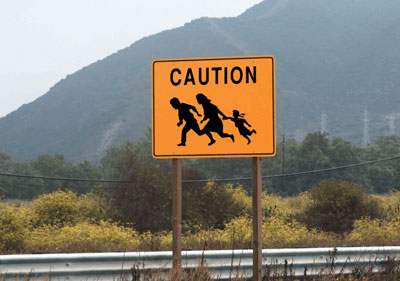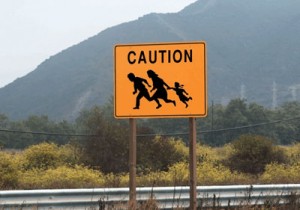Immigration and Justice – by Cynthia Holder Rich
See Pamela K. Brubaker’s Essay, “Dispatches from an Immigration Frontline”
Denominations can take stands – what will happen next is not always clear.
Consider, friends, two actions of the same church and the implications therein.
In 2010, the Presbyterian Church (USA) General Assembly responded to a Commissioner’s Resolution addressing a new immigration law in Arizona, AZ SB1040, and passed a measure prohibiting the General Assembly, its units and offices from holding meetings in Arizona. This action was taken to protest what was perceived by the General Assembly as racist and unjust implications for the powers of law enforcement rising from the new law. Additionally, GA actions of this type are made in the hope that states will feel pressure to reconsider action taken which Presbyterians state through such action is unjust and antithetical to Christ’s teaching.
In February 2011, a Presbyterian stewardship conference was held at a Phoenix, AZ airport hotel. The planning team issued a statement to those who protested the decision to go ahead with plans, despite the General Assembly action. The statement indicated that the GA action had been prayerfully considered, but in that it was a stewardship conference and a move would mean the loss of upwards of $25,000, they couldn’t act in good stewardship and move the conference. Even when offices of the General Assembly offered to cover the losses to assist the conference in making the move to another venue, and even when many bodies within the church requested reconsideration, the planning team was stalwart in their plan.
Two questions
I want to discuss two questions raised by this history.
- How united are Presbyterians behind the action of the General Assembly, in seeing AZ SB1040 as a racist, unjust and dangerous law?
- As God’s stewards, what exactly is it that we are given responsibility by God to steward, manage, or take care of?
The last three General Assemblies of the Presbyterian Church (2006, 2008. 2010) have each taken action on immigration and justice. I have no doubt that action will be considered again at the next General Assembly in 2012. In a context of budget cuts, as the denominational offices continue to reduce staff and redefine what they can and should do at the national, churchwide level, many offices and staff positions which used to be part of that definition no longer exist. But the immigration office remains, at least at present, in part because of the belief of many Presbyterians of the importance of this issue on the national scene and for our church and its ministry.
However, it has become quite clear that immigration is one of many issues on which Presbyterians disagree. When the potential loss of $25,000 is presented as rationale for flying in the face of General Assembly action, readers with critical thinking capacities may suggest that this is one (more) sign of the post-denominational era in which we live. Right you are, gentle readers!
The lack of ecclesiological unity
It also suggests, to me, that we lack a basic unifying ecclesiology. Components of the ecclesiological stance operating for those who chose to go ahead with the conference can be identified. While these can be stated positively, they are often, in practice, stated negatively. I state components in this space, some on either side of that divide. These include:
- Stewardship is part of the call of the church.
- The church is called to manage our money faithfully and responsibly.
- At a time of massive and continuing decline in membership and revenue, the responsibility of the church to manage money faithfully becomes more important – that is, the call of the church to manage money well gains higher priority during a time when the church is in financial difficulty.
- The church is not called to steward people, particularly the rights and dignity of people who are darker-skinned, who the current Arizona law puts at risk – or, the call to be stewards of these issues decreases in priority at a time of budget shortfall.
- We are called to equip people for faithful ministry and discipleship as stewards of money.
- The church is not called to stand in unity and in public against the laws passed by states.
- The church is not called to think critically about why immigration occurs, nor the justice situation in the places from which people seek to enter the US, nor the justice situation people find when they come here.
- While the racial justice issues inherent in the passing of laws such as the one in Arizona are troubling, ultimately, it is not the church’s business to intrude on the decisions made through democratic processes in the states.
I believe we are called to a different understanding of church.
Immigration occurs because justice, safety, and adequate income to keep mind and body together are hard to find in many places on the earth. Because of a host of sins and sinful structures, many people with darker skin tones are included in the group who find themselves, voluntarily or involuntarily, seeking life in a place that is different than their homeland. The United Nations and many other international bodies have published report after report on the great movement of people worldwide, the forces stimulating these moves and the dynamics therein. Business, education, industry, health care systems, and governments respond based on the frameworks of decision-making inherent in their constitutions.
The church is called to be different.
We as a nation are welcoming (please understand I use this term in the broadest and at many moments, the most ironic understanding possible) many people to our shores who are already Christian. For we who are US Christians, these are our brothers and sisters. We have an unequivocal responsibility to them that trumps many other considerations.
We as a nation are welcoming many other people to our shores who are not already Christian. Our responsibility to them is also unequivocal, although theological and ecclesiological arguments can be sustained that the responsibility to people who are not part of the Body is different than to those who are part of the Body. Okay, it may be different; it does not lose its mandate, even if you see the two responsibilities as different.
Here are a few closing thoughts.
- Injustice in the world occurs. We in the church are, I believe, unified in our understanding here.
- We in the church are responsible for some of the injustice in the world. We are equally unified here, I believe.
- We thus are called to confession and repentance, and to advocacy for those who have been victims of injustice.
- In the case of immigration, our confession and repentance as members of the US Christian church must involve the formation and reformation of a comprehensive understanding of our relationship to the peoples of the earth, and a thorough-going reformation of our policy and approach to the issue – and thus to the people trapped by an unjust and sinful set of structures, some of which we have supported overtly, covertly, or unknowingly.
Action on immigration will be discussed by Presbyterians, again, at the 2012 General Assembly. I pray that it will move us toward a more unified and faithful stance as a church about the nature and value of people, and that we will be about the equipping of the church to be the church more fully and more radically than we have in the recent past.
On Wednesday, Pamela Brubaker and Claudio Carvalhaes join the conversation.
See Pamela K. Brubaker’s Essay, “Dispatches from an Immigration Frontline”



It saddens me that the Stewardship Committee would insist on its need to meet in Arizona.
I believe that many businesses today hold (Virtual) conferences by using computers and you can see and talk to the participants.
It would seem that the Stewardship Committee felt under no obligation to investigate alternatives….even such less comfortable ones.
The sad part is the lack of moral strength…….the fact that this group showed little empathy toward other human beings. There is a saying
that “there but for the grace of God, go I”. There is so much effort needed in today’s world to help each other and help preserve God’s gift to us.
If we, who claim to be Christians, do not follow the example of Jesus; if we are not responsible and thoughtful, and if we continue to excuse our actions
we can not look forward to a just future.
Also, if we are willing to go against the majority (in this case I mean GA) then how many times and in how many situations do we act in the
same way? How many times do we say, ” I can ignore what I find inconvenient”?
I am in the Presbytery of the Hudson River.